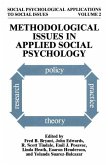For more than half of the 20_ century, psychologists sought to locate the causes of behaviour in individuals and tended to neglect the possibility of locating the psy chological in the social. In the late 1960s, a reaction to that neglect brought about a "crisis" in social psychology. This "crisis" did not affect all social psychologists; some remained seemingly oblivious to its presence; others dismissed its signifi cance and continued much as before. But, in certain quarters, the psychological was re-conceptualised as the social, and the social was taken to be sui generis. Moreover, the possibility of developing general laws and theories to describe and explain social interaction was rejected on the grounds that, as social beings, our actions vary from occasion to occasion, and are, for many reasons, unrepeatable. There is, so it was thought, an inherent instability in the phenomena of interest. The nomothetic ideal was said to rest on individualistic cause-effect positivism ofthe kind which (arguably) characterised the natural sciences, but social psychology (so it was said) is an historical inquiry, and its conclusions are necessarily historically relative (Gergen, 1973). Events outside psychology converged to give impetus to the "crisis" within.
Bitte wählen Sie Ihr Anliegen aus.
Rechnungen
Retourenschein anfordern
Bestellstatus
Storno








